2024届高考英语二轮复习:非谓语动词考点解析课件(共23张PPT)
文档属性
| 名称 | 2024届高考英语二轮复习:非谓语动词考点解析课件(共23张PPT) | 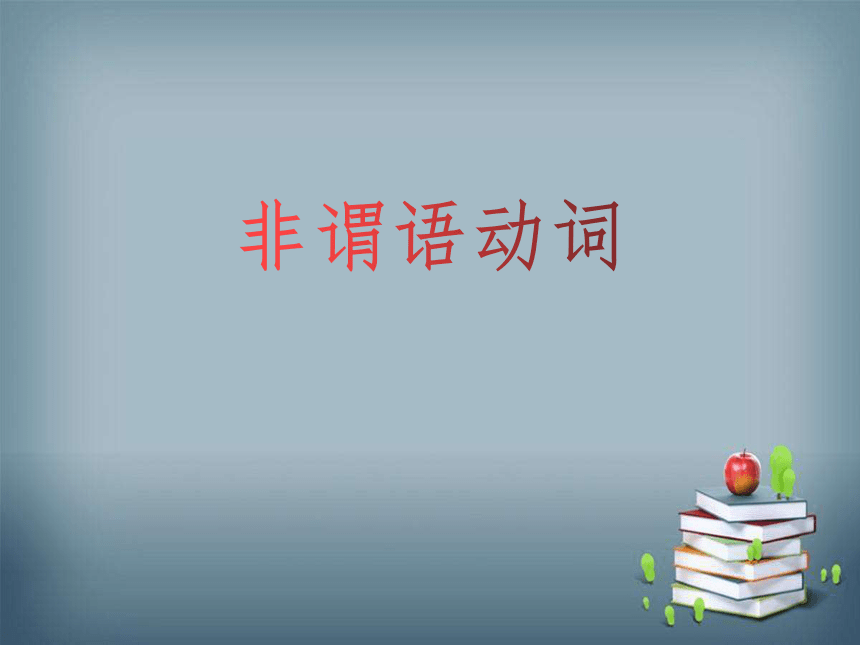 | |
| 格式 | pptx | ||
| 文件大小 | 412.1KB | ||
| 资源类型 | 教案 | ||
| 版本资源 | 通用版 | ||
| 科目 | 英语 | ||
| 更新时间 | 2024-03-04 12:18:55 | ||
图片预览

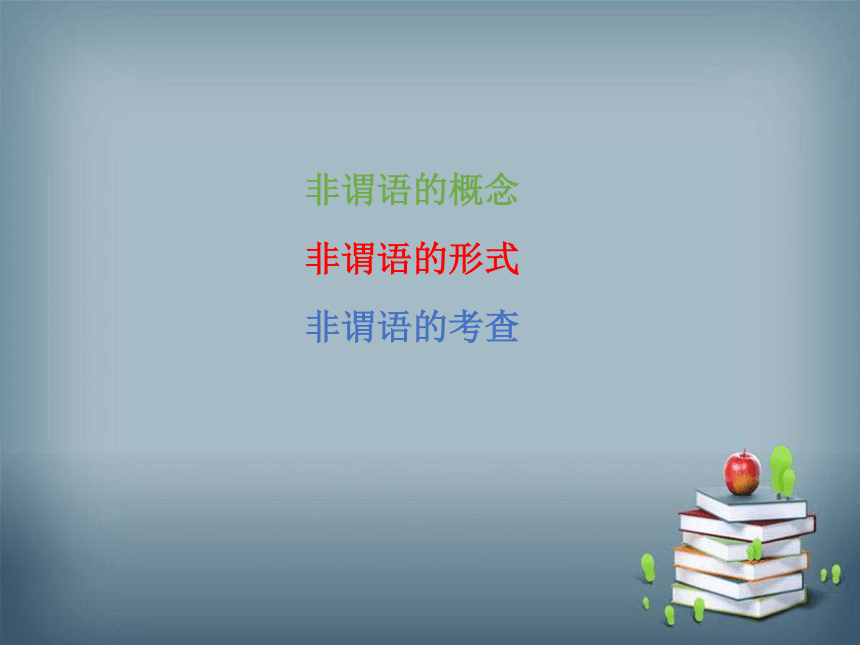
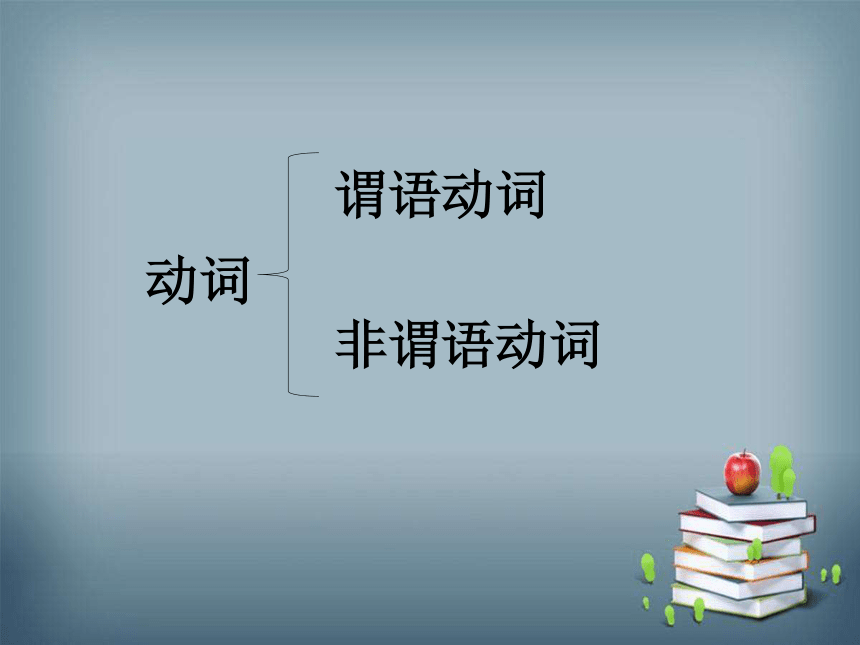


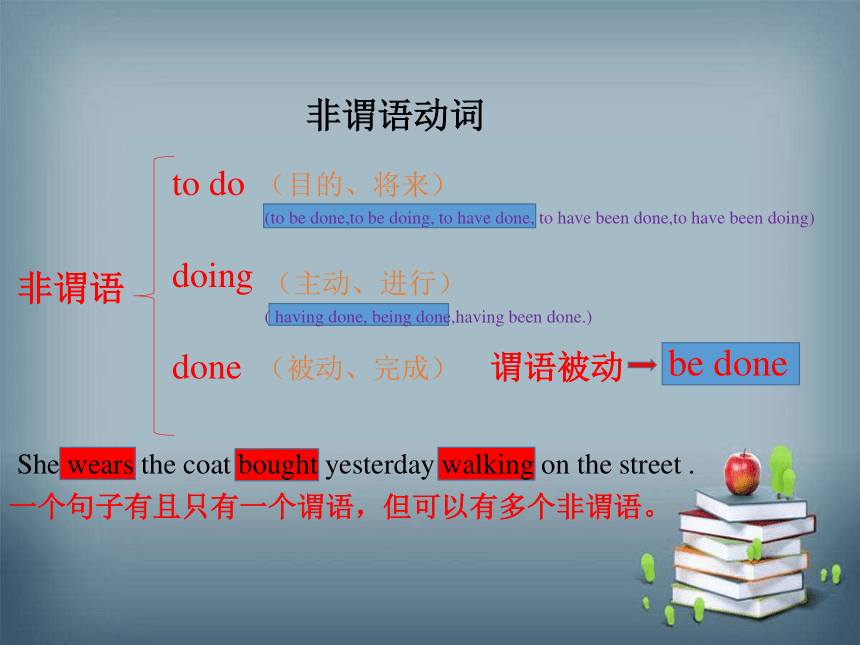
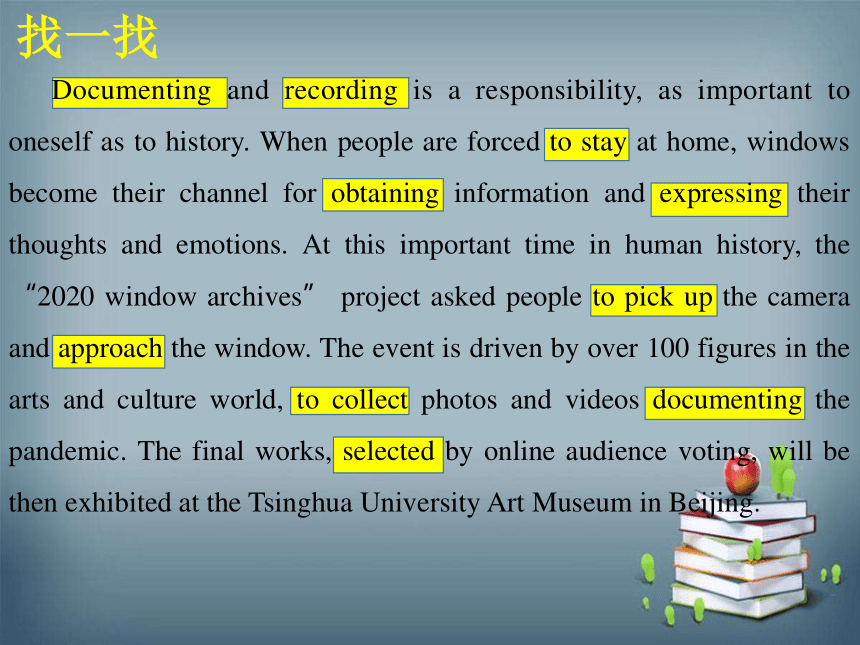
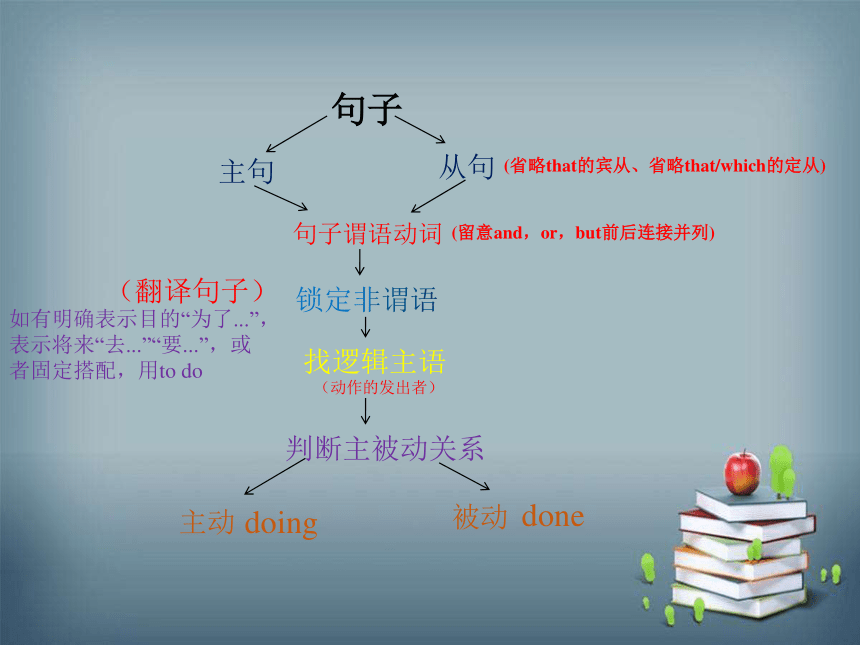
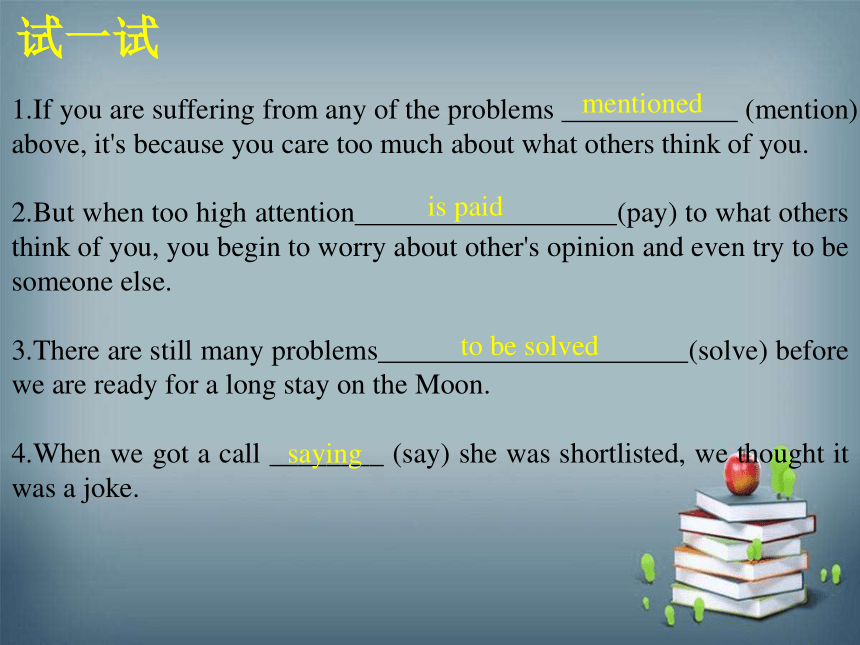
文档简介
(共23张PPT)
非谓语动词
非谓语的概念
非谓语的形式
非谓语的考查
动词
谓语动词
非谓语动词
谓语动词
主+谓+宾/主+系+表/祈使句
I am a doctor.
(一个句子里有且只有一个谓语动词。)
I woke up and got out of bed.
You can come now or you can meet us there.
This isn't a good one but it will answer.
(and,or,but连接并列谓语或句子。)
I like read.
×
I like reading.
√
Napping helps you to stay energetic and focused, improves your memory, uplifts your mood and best of all makes you a creative person.
If you work hard, you will succeed.
(句子有主句、从句)
(when,where,which,who,why,how,if,though,after,before,because,in case...)
非谓语
to do
doing
done
(目的、将来)
(主动、进行)
(被动、完成)
(to be done,to be doing, to have done, to have been done,to have been doing)
( having done, being done,having been done.)
非谓语动词
She wears the coat bought yesterday walking on the street .
一个句子有且只有一个谓语,但可以有多个非谓语。
谓语被动
be done
Documenting and recording is a responsibility, as important to oneself as to history. When people are forced to stay at home, windows become their channel for obtaining information and expressing their thoughts and emotions. At this important time in human history, the “2020 window archives” project asked people to pick up the camera and approach the window. The event is driven by over 100 figures in the arts and culture world, to collect photos and videos documenting the pandemic. The final works, selected by online audience voting, will be then exhibited at the Tsinghua University Art Museum in Beijing.
找一找
句子
主句
从句
句子谓语动词
锁定非谓语
找逻辑主语
(动作的发出者)
判断主被动关系
主动
被动
doing
done
(省略that的宾从、省略that/which的定从)
(留意and,or,but前后连接并列)
(翻译句子)
如有明确表示目的“为了...”,表示将来“去...”“要...”,或者固定搭配,用to do
1.If you are suffering from any of the problems (mention) above, it's because you care too much about what others think of you.
2.But when too high attention (pay) to what others think of you, you begin to worry about other's opinion and even try to be someone else.
3.There are still many problems (solve) before we are ready for a long stay on the Moon.
4.When we got a call ________ (say) she was short listed, we thought it was a joke.
mentioned
is paid
to be solved
saying
试一试
3. (offer) an important role in a new movie, Andy has got a chance to become famous.
4. (order) over a week ago, the books are expected to arrive any time now.
5.Shangdong Province produced 50 million pounds of apples this year, (rank) second in China.
6.Clearly and thoughtfully (write),the book inspires confidence in students who wish to seek their own answers.
Offered
Ordered
ranking
written
7.The cooling wind swept through our bedroom windows,
(make) air conditioning unnecessary
8.A good listener takes part in the conversation, (offer)
ideas and raising questions to keep the talking flowing.
9. (approach) the city centre, we saw a stone statue of about 10 meters in height.
10.The old couple, lived in the small village for years,can tell the names of all the villagers.
making
Offering
Approaching
having
一、介词+doing
1.(2017全国I)Fast food is full of fat and salt; by (eat) more fast food people will get more salt and fat tha they need in their diet.
2.(2016全国III)I showed them I was independent by (wear) strange clothes.
3.(2015全国II) After looks at the toy for some time, he turned around and found
his parents were missing.
4.The film star wears sunglass, he can go shopping without (recognize).
5.After (treat) at a hospital in Birmingham, England, she continued her education in the city and then went on to win the 2014 Nobel Peace Prize.
eating
wearing
being recognized
being treated
looking
非谓语动词考点归纳
二、doing做主语
1.___________ (stay) up late is bad for our health, so we should go to bed early to keep healthy.
2. (care) for an elderly loved one, most likely a parent, is never easy.
3. (hear) how others react to the book you have just read creates an added pleasure.
Staying
Hearing
Caring
▲
名+完整句子
动+完整句子
(省略了that/which的)定从
(省略了that的)宾从
4. Reading books also bring me some skills to solve problem in life.(改错)
brings
三、with复合结构
1.In 1990, Earth Day went global, with 200 million people in over 140 nations (participate).
2.John received an invitation to dinner, and with his work _______(finish), he gladly accepted it.
3.I live in the house with its door (face) to the south.
4.They pretended to be working hard all night with their lights (burn).
5.Outbound(出港的) passengers at the airport hit 5,667 the day before, with a total of around 85,000 people (enter) the terminal.
participating
finished
facing
burning
entering
6.With a science project (complete),Kenvin spent his entire weekend in the library.
7.I can't go out with these clothes (wash).
to complete
to wash
区别:
8.There are still many problems (solve) before we are ready for a long stay on the Moon.
to be solved
with+宾语+宾补
to do
doing
done
(to do)和宾语是被动关系,表示尚未发生的动作,只需判断将来。)
doing和done的逻辑主语都是宾语,直接判断主被动关系即可。
主动、进行
被动、完成
1. (work) on the farm, he learned a lot.
2. (face) with difficulties,we need friends to give us support and help.
四、be+过去分词+介词
be lost in陷入...; be located in坐落于...;be buried in埋头于...;
be exposed to暴露...;be trapped in困于...;be faced with面对...;
be dressed in穿着...; be based on基于...;
be determined to do决定做...;
be filled with 充满...; be fixed on 专注于....;
be devoted to 专心致志于...;
be absorbed in 专注于...;
filled
Exposed
Faced
Working
3.With her eyes (fill) with tears, Jean came to Mr.Li's office to explain what had happened.
4. (expose) to the traditional food, you will surely have a deeper understanding of the city.
5.Looked through the window, I was shocked to see her lying on the floor.
Looking
While walking the dog, you were careless and it got loose and was hit by a car.
从句
主句①
句子
主语+谓语+(宾语)
(you were)
主句②
小结1
当从句主语与主句主语一致且从句谓语是be动词,则从句主谓全部省略
Come tomorrow if possible.
主句(祈使句)
从句
it is
小结2
从句主谓是it+be,直接省略it+be
相同省略常见的有:if necessary; if true; if so; if possible
五、状语从句的省略
3.When (compare) different cultures, we often pay attention only to the differences without noticing the many similarities.
4.Unless (invite) to speak, you should remain silent at the conference.
如何知道是否考察状语从句的省略?
1.Father was preparing a report while I (play) games.
2.There are a few simple safety measures to follow while (train).
看状语从句引导词之后,没有主语即考察状语从句的省略。
如何解题?
在状语从句的省略中,当从句给了动词,直接转换成非谓语来做,
即:
to do
doing
done
表目的和将来
表主动和进行
表被动和完成
解题方法:
1.通过句意翻译找出所给动词的逻辑主语(动作发出者)
2.判断所给动词与其逻辑主语的主被动关系
1.When (take) according to the directions,the drug has fewer side effects.
2.If properly (treat), waste will do no harm to the environment.
3.Once (catch) stealing in a supermarket, you will be punished.
4.Though / Although (blame)for his mistake, the boy didn't seem to be angry.
taken
treated
caught
blamed
区别:
5.If you are suffering from any of the problems (mention) above, it's because you care too much about what others think of you.
mentioned
小试牛刀
6.There are some health problems that, when (treat)in time, can become bigger ones later on.
7.Anyone, once (test) positive for H7N9 flu virus, will receive free medical treatment from our government.
8.When (ask) for his views about his teaching job, Philip said he found it very interesting and rewarding.
9.Film has a much shorter history, especially when (compare) to such art forms as music and painting.
not treated
tested
asked
compared
10.It shames me to say it, but I told a lie when (question) at the meeting by my boss.
11.When first (introduce) to the market, these products enjoyed great success.
12.If (ask)to look after luggage for someone else, inform the police at once.
questioned
introduced
asked
Thank You !
非谓语动词
非谓语的概念
非谓语的形式
非谓语的考查
动词
谓语动词
非谓语动词
谓语动词
主+谓+宾/主+系+表/祈使句
I am a doctor.
(一个句子里有且只有一个谓语动词。)
I woke up and got out of bed.
You can come now or you can meet us there.
This isn't a good one but it will answer.
(and,or,but连接并列谓语或句子。)
I like read.
×
I like reading.
√
Napping helps you to stay energetic and focused, improves your memory, uplifts your mood and best of all makes you a creative person.
If you work hard, you will succeed.
(句子有主句、从句)
(when,where,which,who,why,how,if,though,after,before,because,in case...)
非谓语
to do
doing
done
(目的、将来)
(主动、进行)
(被动、完成)
(to be done,to be doing, to have done, to have been done,to have been doing)
( having done, being done,having been done.)
非谓语动词
She wears the coat bought yesterday walking on the street .
一个句子有且只有一个谓语,但可以有多个非谓语。
谓语被动
be done
Documenting and recording is a responsibility, as important to oneself as to history. When people are forced to stay at home, windows become their channel for obtaining information and expressing their thoughts and emotions. At this important time in human history, the “2020 window archives” project asked people to pick up the camera and approach the window. The event is driven by over 100 figures in the arts and culture world, to collect photos and videos documenting the pandemic. The final works, selected by online audience voting, will be then exhibited at the Tsinghua University Art Museum in Beijing.
找一找
句子
主句
从句
句子谓语动词
锁定非谓语
找逻辑主语
(动作的发出者)
判断主被动关系
主动
被动
doing
done
(省略that的宾从、省略that/which的定从)
(留意and,or,but前后连接并列)
(翻译句子)
如有明确表示目的“为了...”,表示将来“去...”“要...”,或者固定搭配,用to do
1.If you are suffering from any of the problems (mention) above, it's because you care too much about what others think of you.
2.But when too high attention (pay) to what others think of you, you begin to worry about other's opinion and even try to be someone else.
3.There are still many problems (solve) before we are ready for a long stay on the Moon.
4.When we got a call ________ (say) she was short listed, we thought it was a joke.
mentioned
is paid
to be solved
saying
试一试
3. (offer) an important role in a new movie, Andy has got a chance to become famous.
4. (order) over a week ago, the books are expected to arrive any time now.
5.Shangdong Province produced 50 million pounds of apples this year, (rank) second in China.
6.Clearly and thoughtfully (write),the book inspires confidence in students who wish to seek their own answers.
Offered
Ordered
ranking
written
7.The cooling wind swept through our bedroom windows,
(make) air conditioning unnecessary
8.A good listener takes part in the conversation, (offer)
ideas and raising questions to keep the talking flowing.
9. (approach) the city centre, we saw a stone statue of about 10 meters in height.
10.The old couple, lived in the small village for years,can tell the names of all the villagers.
making
Offering
Approaching
having
一、介词+doing
1.(2017全国I)Fast food is full of fat and salt; by (eat) more fast food people will get more salt and fat tha they need in their diet.
2.(2016全国III)I showed them I was independent by (wear) strange clothes.
3.(2015全国II) After looks at the toy for some time, he turned around and found
his parents were missing.
4.The film star wears sunglass, he can go shopping without (recognize).
5.After (treat) at a hospital in Birmingham, England, she continued her education in the city and then went on to win the 2014 Nobel Peace Prize.
eating
wearing
being recognized
being treated
looking
非谓语动词考点归纳
二、doing做主语
1.___________ (stay) up late is bad for our health, so we should go to bed early to keep healthy.
2. (care) for an elderly loved one, most likely a parent, is never easy.
3. (hear) how others react to the book you have just read creates an added pleasure.
Staying
Hearing
Caring
▲
名+完整句子
动+完整句子
(省略了that/which的)定从
(省略了that的)宾从
4. Reading books also bring me some skills to solve problem in life.(改错)
brings
三、with复合结构
1.In 1990, Earth Day went global, with 200 million people in over 140 nations (participate).
2.John received an invitation to dinner, and with his work _______(finish), he gladly accepted it.
3.I live in the house with its door (face) to the south.
4.They pretended to be working hard all night with their lights (burn).
5.Outbound(出港的) passengers at the airport hit 5,667 the day before, with a total of around 85,000 people (enter) the terminal.
participating
finished
facing
burning
entering
6.With a science project (complete),Kenvin spent his entire weekend in the library.
7.I can't go out with these clothes (wash).
to complete
to wash
区别:
8.There are still many problems (solve) before we are ready for a long stay on the Moon.
to be solved
with+宾语+宾补
to do
doing
done
(to do)和宾语是被动关系,表示尚未发生的动作,只需判断将来。)
doing和done的逻辑主语都是宾语,直接判断主被动关系即可。
主动、进行
被动、完成
1. (work) on the farm, he learned a lot.
2. (face) with difficulties,we need friends to give us support and help.
四、be+过去分词+介词
be lost in陷入...; be located in坐落于...;be buried in埋头于...;
be exposed to暴露...;be trapped in困于...;be faced with面对...;
be dressed in穿着...; be based on基于...;
be determined to do决定做...;
be filled with 充满...; be fixed on 专注于....;
be devoted to 专心致志于...;
be absorbed in 专注于...;
filled
Exposed
Faced
Working
3.With her eyes (fill) with tears, Jean came to Mr.Li's office to explain what had happened.
4. (expose) to the traditional food, you will surely have a deeper understanding of the city.
5.Looked through the window, I was shocked to see her lying on the floor.
Looking
While walking the dog, you were careless and it got loose and was hit by a car.
从句
主句①
句子
主语+谓语+(宾语)
(you were)
主句②
小结1
当从句主语与主句主语一致且从句谓语是be动词,则从句主谓全部省略
Come tomorrow if possible.
主句(祈使句)
从句
it is
小结2
从句主谓是it+be,直接省略it+be
相同省略常见的有:if necessary; if true; if so; if possible
五、状语从句的省略
3.When (compare) different cultures, we often pay attention only to the differences without noticing the many similarities.
4.Unless (invite) to speak, you should remain silent at the conference.
如何知道是否考察状语从句的省略?
1.Father was preparing a report while I (play) games.
2.There are a few simple safety measures to follow while (train).
看状语从句引导词之后,没有主语即考察状语从句的省略。
如何解题?
在状语从句的省略中,当从句给了动词,直接转换成非谓语来做,
即:
to do
doing
done
表目的和将来
表主动和进行
表被动和完成
解题方法:
1.通过句意翻译找出所给动词的逻辑主语(动作发出者)
2.判断所给动词与其逻辑主语的主被动关系
1.When (take) according to the directions,the drug has fewer side effects.
2.If properly (treat), waste will do no harm to the environment.
3.Once (catch) stealing in a supermarket, you will be punished.
4.Though / Although (blame)for his mistake, the boy didn't seem to be angry.
taken
treated
caught
blamed
区别:
5.If you are suffering from any of the problems (mention) above, it's because you care too much about what others think of you.
mentioned
小试牛刀
6.There are some health problems that, when (treat)in time, can become bigger ones later on.
7.Anyone, once (test) positive for H7N9 flu virus, will receive free medical treatment from our government.
8.When (ask) for his views about his teaching job, Philip said he found it very interesting and rewarding.
9.Film has a much shorter history, especially when (compare) to such art forms as music and painting.
not treated
tested
asked
compared
10.It shames me to say it, but I told a lie when (question) at the meeting by my boss.
11.When first (introduce) to the market, these products enjoyed great success.
12.If (ask)to look after luggage for someone else, inform the police at once.
questioned
introduced
asked
Thank You !
